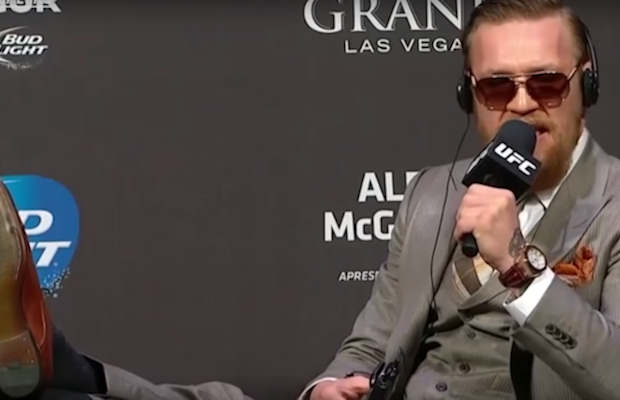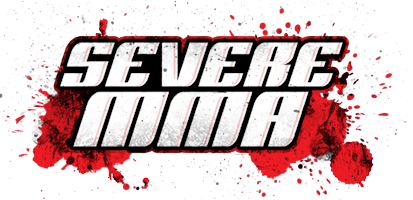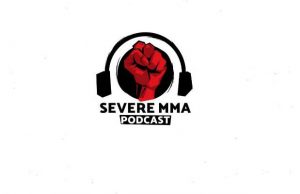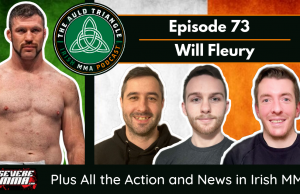

By Severe MMA guest columnist Ralph Welch
“The comparison between McGregor and Rousey is a really interesting one. You have two of the elite, yet two very different mindsets. For Rousey a loss is utterly cataclysmic. But McGregor has no fear of failure whatsoever. He embraces it. That’s what makes him so special.”
Hazel Gale, decorated international amateur boxer/kickboxer turned sports psychologist, relaxes into her chair. She works out of her intentionally sparse office in east London, an area of this old city that used to be home to spit and sawdust gyms that spawned the likes of Terry Spinks, Charlie Magri and many other storied pugilists.
If you look hard enough, you can still find remnants of the old fight factories, though now the collars have turned from blue to white: evening classes for bankers, marketeers and directors of the abundance of creative agencies that inhabit Shoreditch and the surrounding postcodes.
It’s a collision of two cultures. And in the middle sits Gale, using her unique background to cross between both worlds.
Since retiring from the ring, having won trophies in every weight class she entered, she has devoted herself to matters of the mind. A qualified Cognitive Hypnotherapist, she now focuses on helping performance athletes – and executives of industry – conquer the limitations of the human conscious to achieve their potential.
In Conor McGregor she sees the traits of someone already operating at those limits.
“McGregor is the perfect example of what we call a growth mindset,” she said. “A growth mindset person believes that we can always get better. Their focus is on learning in any situation. There is no such thing as failure, only feedback.”
John Kavanagh, McGregor’s coach and doyen of the expanding Straight Blast Gym (SBG) brand, often quotes a mantra when one of his charges has to deal with defeat. The words “we win or we learn” are typically derided by the naysayers on social media who see it as feeble consolation for failure. In fact, Gale argues that in the long term this is critical to his athletes’ success.
“This is classic growth mindset methodology,” she said. “The outcome doesn’t matter as long as you’ve learned something along the way. It’s never nice to lose but if you can reframe that loss and say ‘here’s a load of really valuable information that I can use to be better next time’, then it takes the sting out of it.”
Nowhere has the sting of defeat been felt more painfully than in camp Rousey. The undisputed queen of MMA – and Hollywood darling – has experienced a brutal fall from grace. Since the crown was ripped violently from her grasp by Holly Holm at UFC 193, there has been a prolonged period of introspection.
There have been sporadic public appearances of late. Tentative steps back into the spotlight. One of those, on the Ellen DeGeneres Show, revealed that the former bantamweight champion even contemplated suicide in the aftermath of her first professional defeat. It was no flippant comment given the tragic loss of her father during her childhood.
“A fixed mindset person needs to be the best in their field – or very near the top – in order to believe that they’re good enough as a person,” said Gale. “Ronda Rousey has been extremely successful. So driven. Losses are super-difficult. The suicidal thoughts talk is the perfect example of what happens when someone gets really high up with a fixed mindset and then suffers a loss. The whole thing breaks down.
“Society, the world, forces the fixed mindset on us. Our parents and teachers have all reinforced this. What’s the first thing they want to say? ‘Well done, you’re really good at this. You’re a star.’ Believing that we are naturally talented and therefore shouldn’t need to work hard (or fail) puts us in a fixed state. But that’s what we feel like we want to say. Not ‘well done, you must have worked hard’. That feels like a lame compliment but actually in the long run that’s gold dust.
“If I’m talented in a fixed mindset then one loss is going to absolutely break me because I’m suddenly not talented anymore. That’s the challenge Rousey faces. To come back from that, she has to overcome the fixed mindset in order to rise from the ashes.”
Gale is talking from bitter experience. In the mid-part of her career, injuries and self-doubt plagued her performances. The titles dried up and she often contemplated retirement.
“I had a totally fixed mindset when I was competing. That’s why I made myself so sick and that’s why I crumbled. I was lucky enough to get the right therapy. That’s how I came back out of it. I put myself in the growth mindset, embracing losses as learning experiences, to finish off my career strongly with more titles.”
Gale’s comments echo those of former UFC heavyweight champion and current WWE superstar Brock Lesnar. In a recent interview on ESPN, Lesnar asserted that Rousey had to “learn how to lose” if she was to recover her MMA career.
McGregor experienced defeat early in his pro career, losing two of his first six paid outings. It was Kavanagh that helped him frame those not as catastrophic, but as compulsory learning on the long path to being a UFC champion.
The featherweight strapholder has his eyes on more gold. Though his clash with lightweight champion Rafael Dos Anjos was postponed due to an injury to the latter, the Irishman has made no secret of his intention to win titles in multiple divisions.
It is unheard of in a sport where the level of competition is such that titles pass hands routinely. As a general rule, success in this game can be fleeting.
However, McGregor has shown scant regard for tradition in his eventful UFC tenure. His press conferences have become the stuff of legend: a conveyor belt of quotes that satisfies even the hungriest of headline writers.
Meanwhile, his training methods show a thirst for knowledge that few of his peers can match. Many search for textbook technique. McGregor, however, has pushed contemporary literature to the side and sought out the unconventional. His social media output is filled with highlights of innovative training sessions.
“Clearly McGregor has a spectacular work ethic. Plus his preparation is expansive and open, which is compatible with the growth mindset. He doesn’t do average training. He’s constantly experimenting,” said Gale.
“People scoffed before the Aldo fight when they saw McGregor ducking under a broom with his movement coach while Aldo was angrily punching a bag. But that open approach to training means he (McGregor) has so much more available to him. He’s still doing all the other conventional stuff, of course. It just means he’s got this wide broad range of things to take from. In this regard, he reminds me of Michael Phelps,” said Gale.
She cites the example of the American’s preparation for the 2008 Olympics in Beijing. In his quest for a staggering eight gold medals, Phelps left nothing to chance. He trained for every possible scenario, including swimming in total darkness. Every night he coloured in his goggles with a Sharpie so that he learned how to perform whilst essentially blind.
Experts had long since agreed that Phelps had all the conventional genetic and athletic gifts one would require to create a successful swimmer. Yet here he was, the blueprint for perfection in the pool, shunning convention.
It soon paid dividends.
In the 200m butterfly final in China, Phelps was the victim of a freak occurrence when his goggles suddenly filled with water. Had it happened to one of his peers, their race would surely have been over. Phelps, however, drew upon the experience of those blindfolded swims.
He may have been robbed of sight but the warmth of the water provided comfort to his heightened senses. He focussed on his breathing, his stroke patterns and powered forward.
In the event, Phelps didn’t just win the gold; he broke the world record in the process. His nightmare had produced a dream result.
There was one particular scenario that many prophesised would curtail Conor McGregor: his collision with a traditional American wrestler. That played out in slightly unexpected circumstances at UFC 189 when “Notorious” fought late-notice replacement Chad Mendes.
The Team Alpha Male man had a reputation for muscular matwork and in the first round he found himself in familiar territory. A textbook takedown put McGregor on the canvas for the first time in his UFC ledger. Blows rained down from above and dark clouds gathered. With plenty of time on the clock, commentator Joe Rogan cast doubt on McGregor’s ability to survive the storm.
The Irish horde, whose battle cry had roared their man forward from the bell, fell silent.
Despite the flurry of fists aimed in his direction, McGregor remained calm during the biggest crisis of his career. Whilst the world may have feared how he would fare against a classic Stars and Stripes grappler, the Dubliner’s self-belief held firm.
According to Gale, McGregor’s relationship with fear was key to his composure.
“Fear and belief are inextricably bound,” she said. “If you fear failure, then a part of you must believe that it’s going to, or could, happen. In those moments during a fight when you’re in trouble, in a place you absolutely don’t want to be, that’s when belief and fear can take hold. That can cause you to give up.”
Looking back at the footage, it’s startling to witness McGregor’s response. There is no panic. Movements are measured and controlled. Aesthetically his face shows the effects of Mendes’s dominance. However, his resolve remains unblemished.
“Fighters don’t necessarily feel much pain during a fight,” said Gale. “They feel fear. Fear of failure. If you’re a fixed mindset athlete then in that moment you’re potentially going to be overcome with fear and dread about what’s about to come: the reality of loss.
“The irony is that the less you fear failure, the less you find yourself having it. It’s the law of attraction: negative self-fulfilling prophecies. If you don’t fear failure, then you’re free of that trap.”
McGregor’s free form in his fighting stance has divided opinion. Hands low, chin high is the very antithesis of boxing literature. The sort of hapless technique that many a grizzled boxing coach corrects the first day a young prospect walks into the gym. Keep your hands high and tuck your chin, kid. That’s a start.
In McGregor, pugilistic purists see weakness. Karate practitioners see redemption. Gale explains that she sees freedom. A freedom for McGregor to able to be perfectly in flow, the state of mind associated with flawless athletic performance.
“Flow is a period of unconscious competence,” she said. “It occurs when you’re unconsciously responding to your environment without interference from your slow, and limited, conscious mind. We all have moments of flow when we’re good enough at certain things. When you’ve done it enough, you can switch off and go into flow.
“In flow, past and future cease to exist – which is really key in sport because you don’t fear any outcome. You’re free from anxiety and worry.”
Like Phelps in the pool, ensconced in darkness but effortlessly scything through the water on instinct alone, McGregor was in flow during his brief title clash with Jose Aldo.
“He’d clearly studied and drilled for that precise moment,” she said. “He even spoke about it continually before the fight. And when the opportunity arose, he struck instinctively.”
The footage supports this theory. Aldo prowls around the cage, refusing to make eye contact with his foe. He is clearly on edge, anxious for the opening bell.
McGregor, meanwhile remains in harmony. This is the moment he has visualised hundreds of times before. He knows his arch-rival. He has studied his character, his movements. As they face up for the referee’s final instructions, and the noise reaches a crescendo, he notices a barely perceptible twitch in Aldo’s right hand. It confirms his suspicions.
When that first punch arrives, just as he predicted it would, it is misjudged. In his haste, Aldo over-stretches. It leaves him momentarily vulnerable. McGregor reacts instinctively and inflicts a stunning one-punch knockout.
“Your conscious mind is half a second behind reality,” said Gale. “You can’t think consciously in a fight and respond to punches. It’s impossible. Punches take less than half a second to reach your face.
“McGregor had enough experience and skill, enough confidence and was free enough of fear to be able to be completely fluid. That Aldo knockout was flow in its purest form.”
Confidence oozes from McGregor every time he speaks.
In less than three years he has completely changed our expectations of the art of selling a fight. There have been plenty of highly talented combatants who couldn’t draw flies to watch them. McGregor’s bombastic personality ticks all the boxes on the UFC’s holy trinity: tickets, TV and t-shirts.
When your press conferences attract 350,000 viewers on YouTube, you are in rare air as a prizefighter.
And the numbers keep rising: gate receipts, pay-per-view buys, seven-figure fight purses. It has afforded him a plethora of bespoke tailored suits and fast cars, provoking comparisons with Floyd Mayweather, boxing’s ultimate braggadocio.
Yet listening to Gale, it’s clear that behind the ballyhoo lies a mental strength of quite extraordinary measure. It explains McGregor’s willingness to challenge everything we previously held true about Mixed Martial Arts.
This week he squares off against Nate Diaz in a division a full 25lb above his customary weight class. Ordinarily, we’d consider it madness. In MMA’s ballet of violence, weight and power are considered essential dance partners.
With two such combustible characters as McGregor and Diaz locked inside the chain link fence, it’s hard to make confident predictions about the outcome.
What we do know is that the Irishman will make the lonely walk to the octagon bolstered by a deep-rooted mindset that provides the foundation for peak performance.
He has spent time in the company of defeat and mastered it. Fear of failure will not inhibit his self-expression.
One day he will lose again, at least according to the criteria in the unified rules of Mixed Martial Arts. It may be surprising. It will likely be disappointing. But it won’t define him.
This is all part of the Conor McGregor journey.
One that continues to redefine history with every step.
Ralph Welch is a freelance writer who has contributed to BT Sport, The Mirror, Severe MMA and UFC.com. Follow him on Twitter @ralphwelchmma
Hazel Gale (www.hazelgale.co.uk) is a Cognitive Hypnotherapist specialising in athletic performance. Her achievements are as follows:
Kickboxing:
- ISKA Full Contact Fighter Of The Year, 2010
- ISKA Full Contact World Champion, 2010
- ISKA Light Continuous World Champion, 2010
- ISKA Full Contact European Champion, 2009
- WAKO Full Contact British Champion, 2008
Boxing:
- ABA National Boxing Champion, 2013
- Hvidovre (Denmark) Box Cup Champion, 2013
- Haringey Box Cup Champion, 2011
- ABA National Boxing Champion, 2011



